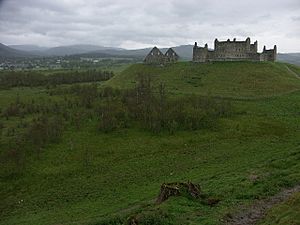Siege of Ruthven Barracks (1745) facts for kids
Quick facts for kids Siege of Ruthven Barracks (1745) |
|||||||
|---|---|---|---|---|---|---|---|
| Part of the Jacobite rising of 1745 | |||||||
 The remains of Ruthven Barracks |
|||||||
|
|||||||
| Belligerents | |||||||
| Commanders and leaders | |||||||
| Strength | |||||||
| 15 | 150 | ||||||
| Casualties and losses | |||||||
| 1 killed | 2 killed | ||||||
The Siege of Ruthven Barracks was a short but brave fight that happened in August 1745. It was part of a bigger event called the Jacobite rising of 1745, where people known as Jacobites tried to put a new king on the throne of Great Britain. In this siege, a small group of government soldiers defended their fort against many Jacobite rebels.
Contents
A Brave Stand: The Story Begins
On August 29, 1745, about 300 Jacobite rebels marched towards Ruthven Barracks. This fort was held by the British government. Inside, Sergeant Terrance Molloy was in charge. He had only 14 other soldiers with him, making a total of 15 defenders.
The Jacobites reached the barracks gate and demanded that Sergeant Molloy give up. Molloy was very brave and refused to surrender. Even when the Jacobites threatened to hang him and his men, he stood firm. After this, the Jacobites moved back a little distance.
The Night Attack: A Fierce Fight
As night fell, around 150 Jacobite fighters returned to attack the barracks. They tried to set the main gate on fire, but the soldiers inside quickly put it out. The person who started the fire was seen and became one of the first to be hurt.
Around 3:30 in the morning, the Jacobites finally gave up their attack and left. Sergeant Molloy then agreed to talk to two of the Jacobite leaders. He still refused to surrender the barracks. However, he did allow the Jacobites to collect their dead and wounded soldiers.
The Jacobites had lost two men and several others were hurt. The government soldiers had only lost one man. This soldier was killed when he lifted his head above the fort's wall, even though he had been told to keep it down for safety.
What Happened Next: A Promotion and a Return
After the siege, the Jacobites left Ruthven. But before they went, they took many supplies from the people living in Ruthven Village.
Sergeant Molloy was immediately promoted to the rank of lieutenant because of his bravery. The story of Ruthven Barracks didn't end there. On February 10, 1746, 300 Jacobites returned to attack Ruthven Barracks again. This time, they brought artillery, which are big cannons, making the next fight much harder.
See also
 | Bessie Coleman |
 | Spann Watson |
 | Jill E. Brown |
 | Sherman W. White |

